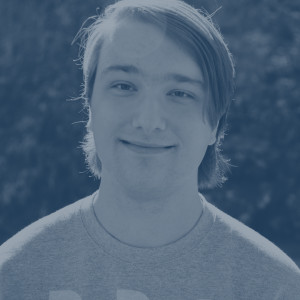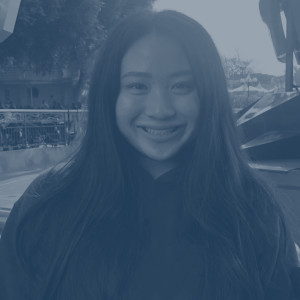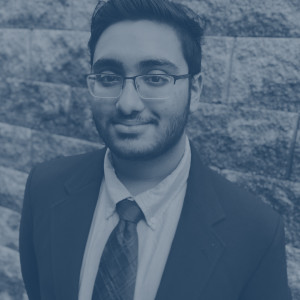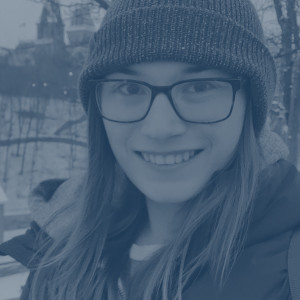Ayaan Haque, 17
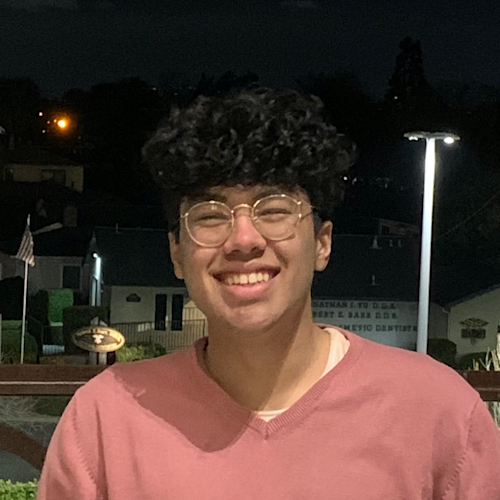
Ayaan first heard about hackathons as a freshman in high school, when a friend told him about a coding competition where she stayed at a convention center overnight and built a cool computer science project. Ayaan had little app or web development knowledge, so he spent a few months learning Swift to prepare for a hackathon. He eventually signed up for Omnihacks and was hyped to experience a hackathon firsthand. He and his friends packed sleeping bags and brought snacks (just in case), then took a train to the event. The theme was Healthcare, so they decided to create an IOS app that let blind patients read prescriptions with an OCR. The app became Tickbird, named after the bird species that help rhinos traverse the world, and it not only received a top 10 award and 2nd best mobile app, but they were able to get the app approved for the App Store after some structural changes. The entire experience was a blast, as they goofed around for much of the first day, attended great machine learning workshops, and hoarded whatever snacks and food they could find. That weekend was the beginning of Ayaan's Hackathon career, and now, a year and a half later, he is a seasoned veteran who is so glad he jumped into his first hackathon despite not even really knowing what it was.
Hackathons are an extremely significant part of Ayaan’s life throughout high school, not only building his talents and helping him shape a future career in computer science, but also proving critical in improving his friendships and philosophy on teamwork. Ayaan joined the hackathon community with a different team than he works with now, starting with a high school friend he wasn’t close to but who shared his interest in app development. His friend was talented and had more coding experience than Ayaan, and they formed a great partnership where Ayaan learned and improved his skills. As his skills increased, Ayaan and the friend drifted apart, so he decided to share his passion for hackathons with his group of best friends that had no hackathon experience (shoutout Viraaj, Adithya, Ishaan, and Sajiv). It was up to Ayaan to teach the group, and once he realized that leading was his role, he embraced the fact that his own success could only be defined by the group’s success. This mentality shift was a turning point, and after one event they started winning hackathon after hackathon through the rest of the summer. Those 4 months of back-to-back events helped Ayaan strengthen valuable friendships and improve his mentality by teaching him the importance of communication and trust, and they hope to have the same fun experiences this summer.
Ayaan has worked extensively on giving back to the hackathon community as a mentor and fellow hacker. Aspiring coders around the world, from India to Seattle to Ohio, have reached out to him asking for tips and help, and he remains in touch with them to this day. In his local community, he helps students at his school with advice on project management skills such as time management, project ideation, and coding itself. Ayaan also teaches computer science and other STEM concepts in a variety of places, such as robotics at the local YMCA, an AI class for the city, and (his favorite) a robotics and STEM program called Jaago Robotics at the Jaago School in Bangladesh, his home country.
Encouraged by his mentees’ inquisitiveness, Ayaan and his team started a personal club for hackathon enthusiasts to mentor anyone interested during their free weekends. The club has been very successful, teaching multiple students to become successful hackers and driven individuals who will assume leadership positions to hopefully keep the club alive, training hackers for many years to come. Their team found a way to make a strong impact in their local community through mentorship, and by promoting hackathons to many students, Ayaan hopes that others will make the same great memories at hackathons that he had.
As of now, Ayaan wants to pursue academic AI research at institutes such as Google AI or DeepMind Labs, or in a university setting. Hackathons have given him the skills he needs to pursue lab-based research when he goes to university. He has spent many weeks developing hard skills in software engineering through AI-based projects, learning the inner workings of AI frameworks PyTorch and Keras, and growing his understanding of high-level theory; however, hackathons have also helped Ayaan develop his soft skills. Conducting AI research involves creating large-scale AI solutions under strict deadlines and pressure, skills Ayaan developed from hackathons and the hacker community, as building functional and innovative projects in 1-2 days taught him to be efficient and focused. Both domains also involve working well with small teams and having constant communication and smart division of labor amongst themselves. Failures and mistakes are also inevitably present, and hackathons have allowed him to make mistakes and get better at recovering from them. Preventing failure can involve reconstructing miswritten code or retraining a model with flawed parameters, yet it always involves precision and attention to detail, skills imperative to running proper experiments and creating reproducible code. Most importantly, however, Hackathons have helped Ayaan develop a creative and innovative mind, forcing him to formulate projects novel to the field, as uniqueness is important to event judges. The ideas need to be real solutions that are helpful to people and improve upon current standards. In AI research, each published paper presents a new method of achieving a task that improves on past work, so Ayaan’s experience in finding novel solutions to present issues will hopefully help him become a great AI researcher in his future career.
Ayaan’s favorite hackathon project is SuiSense, a web application that uses AI to distinguish between suicidal and depressive messages, using NLP deep neural networks that perform classification between suicide and depression in text format using data from Reddit. The project began at Same Home Different Hacks in June 2020, where they received an honorable mention, but it has since been refined into a real application that can have a large impact on people’s lives. Inspired by the story of Alexandra Valores, a girl who lost her life to suicide, Ayaan’s team spent every day for two months after the hackathon working to improve the algorithm and implement new features, and 500 commits later, they had a great final product. They wrote an article about the app which quickly caught traction, and reached out to therapists in the Bay Area as well as mental health support groups at his school to get professional input. Such interactions were a great opportunity for them, allowing them to share their work with potential users and learn how to optimize the application for real-world impact. Their efforts earned them 4th place at the Congressional App Challenge, and they are now working to implement SuiSense in their school and other local organizations. You can watch a video demo of SuiSense here.
After attending a number of hackathons and immersing himself in the hacker community, Ayaan realized that some hackathon attendees are more focused on winning prizes rather than uplifting the community or the many professional and social benefits of attending. While Ayaan has found great success as a hacker, it is even more important for him to help other hackers have positive experiences and achieve the same success that he has. In talking with hackers, he has seen their eagerness to learn and grow from the mentorship of experienced hackers like himself. Many students who attend hackathons enter as skilled coders with strong tech backgrounds, but because Ayaan started with no such background and learned everything through the community, he relates to and eagerly helps those who started like he did because they are the foundation and structure of the community. This path allows Ayaan to continue to grow and build the hacker community even while just being in high school, showing that there is support for people outside of STEM to freely and comfortably learn to become a hacker.
Finally, Ayaan would like to again shout out his teammates, Viraaj, Adithya, Ishaan, and Sajiv for being great friends who have supported him over the last year and made hacking a very enjoyable experience.
Quick Facts
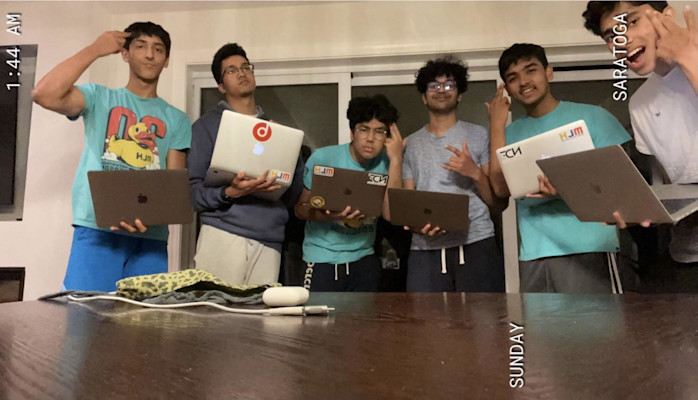
Ayaan Haque, 17

Ayaan first heard about hackathons as a freshman in high school, when a friend told him about a coding competition where she stayed at a convention center overnight and built a cool computer science project. Ayaan had little app or web development knowledge, so he spent a few months learning Swift to prepare for a hackathon. He eventually signed up for Omnihacks and was hyped to experience a hackathon firsthand. He and his friends packed sleeping bags and brought snacks (just in case), then took a train to the event. The theme was Healthcare, so they decided to create an IOS app that let blind patients read prescriptions with an OCR. The app became Tickbird, named after the bird species that help rhinos traverse the world, and it not only received a top 10 award and 2nd best mobile app, but they were able to get the app approved for the App Store after some structural changes. The entire experience was a blast, as they goofed around for much of the first day, attended great machine learning workshops, and hoarded whatever snacks and food they could find. That weekend was the beginning of Ayaan's Hackathon career, and now, a year and a half later, he is a seasoned veteran who is so glad he jumped into his first hackathon despite not even really knowing what it was.
Hackathons are an extremely significant part of Ayaan’s life throughout high school, not only building his talents and helping him shape a future career in computer science, but also proving critical in improving his friendships and philosophy on teamwork. Ayaan joined the hackathon community with a different team than he works with now, starting with a high school friend he wasn’t close to but who shared his interest in app development. His friend was talented and had more coding experience than Ayaan, and they formed a great partnership where Ayaan learned and improved his skills. As his skills increased, Ayaan and the friend drifted apart, so he decided to share his passion for hackathons with his group of best friends that had no hackathon experience (shoutout Viraaj, Adithya, Ishaan, and Sajiv). It was up to Ayaan to teach the group, and once he realized that leading was his role, he embraced the fact that his own success could only be defined by the group’s success. This mentality shift was a turning point, and after one event they started winning hackathon after hackathon through the rest of the summer. Those 4 months of back-to-back events helped Ayaan strengthen valuable friendships and improve his mentality by teaching him the importance of communication and trust, and they hope to have the same fun experiences this summer.
Ayaan has worked extensively on giving back to the hackathon community as a mentor and fellow hacker. Aspiring coders around the world, from India to Seattle to Ohio, have reached out to him asking for tips and help, and he remains in touch with them to this day. In his local community, he helps students at his school with advice on project management skills such as time management, project ideation, and coding itself. Ayaan also teaches computer science and other STEM concepts in a variety of places, such as robotics at the local YMCA, an AI class for the city, and (his favorite) a robotics and STEM program called Jaago Robotics at the Jaago School in Bangladesh, his home country.
Encouraged by his mentees’ inquisitiveness, Ayaan and his team started a personal club for hackathon enthusiasts to mentor anyone interested during their free weekends. The club has been very successful, teaching multiple students to become successful hackers and driven individuals who will assume leadership positions to hopefully keep the club alive, training hackers for many years to come. Their team found a way to make a strong impact in their local community through mentorship, and by promoting hackathons to many students, Ayaan hopes that others will make the same great memories at hackathons that he had.
As of now, Ayaan wants to pursue academic AI research at institutes such as Google AI or DeepMind Labs, or in a university setting. Hackathons have given him the skills he needs to pursue lab-based research when he goes to university. He has spent many weeks developing hard skills in software engineering through AI-based projects, learning the inner workings of AI frameworks PyTorch and Keras, and growing his understanding of high-level theory; however, hackathons have also helped Ayaan develop his soft skills. Conducting AI research involves creating large-scale AI solutions under strict deadlines and pressure, skills Ayaan developed from hackathons and the hacker community, as building functional and innovative projects in 1-2 days taught him to be efficient and focused. Both domains also involve working well with small teams and having constant communication and smart division of labor amongst themselves. Failures and mistakes are also inevitably present, and hackathons have allowed him to make mistakes and get better at recovering from them. Preventing failure can involve reconstructing miswritten code or retraining a model with flawed parameters, yet it always involves precision and attention to detail, skills imperative to running proper experiments and creating reproducible code. Most importantly, however, Hackathons have helped Ayaan develop a creative and innovative mind, forcing him to formulate projects novel to the field, as uniqueness is important to event judges. The ideas need to be real solutions that are helpful to people and improve upon current standards. In AI research, each published paper presents a new method of achieving a task that improves on past work, so Ayaan’s experience in finding novel solutions to present issues will hopefully help him become a great AI researcher in his future career.
Ayaan’s favorite hackathon project is SuiSense, a web application that uses AI to distinguish between suicidal and depressive messages, using NLP deep neural networks that perform classification between suicide and depression in text format using data from Reddit. The project began at Same Home Different Hacks in June 2020, where they received an honorable mention, but it has since been refined into a real application that can have a large impact on people’s lives. Inspired by the story of Alexandra Valores, a girl who lost her life to suicide, Ayaan’s team spent every day for two months after the hackathon working to improve the algorithm and implement new features, and 500 commits later, they had a great final product. They wrote an article about the app which quickly caught traction, and reached out to therapists in the Bay Area as well as mental health support groups at his school to get professional input. Such interactions were a great opportunity for them, allowing them to share their work with potential users and learn how to optimize the application for real-world impact. Their efforts earned them 4th place at the Congressional App Challenge, and they are now working to implement SuiSense in their school and other local organizations. You can watch a video demo of SuiSense here.
After attending a number of hackathons and immersing himself in the hacker community, Ayaan realized that some hackathon attendees are more focused on winning prizes rather than uplifting the community or the many professional and social benefits of attending. While Ayaan has found great success as a hacker, it is even more important for him to help other hackers have positive experiences and achieve the same success that he has. In talking with hackers, he has seen their eagerness to learn and grow from the mentorship of experienced hackers like himself. Many students who attend hackathons enter as skilled coders with strong tech backgrounds, but because Ayaan started with no such background and learned everything through the community, he relates to and eagerly helps those who started like he did because they are the foundation and structure of the community. This path allows Ayaan to continue to grow and build the hacker community even while just being in high school, showing that there is support for people outside of STEM to freely and comfortably learn to become a hacker.
Finally, Ayaan would like to again shout out his teammates, Viraaj, Adithya, Ishaan, and Sajiv for being great friends who have supported him over the last year and made hacking a very enjoyable experience.
Quick Facts

